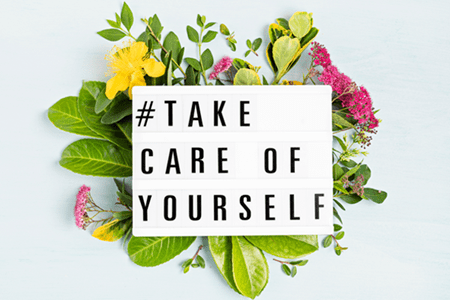After the 2016 election, Dr. Kevin Smith and his colleagues conducted a study in which nearly 40% of respondents reported that politics caused them stress. Around 20% mentioned experiencing loss of sleep, depression, or fatigue due to political events. Anger, frustration, guilt, and even regret for comments made in the heat of the moment were reported by 10-30% of participants. More recently, a 2023 study by Ford et al. revealed that daily political events contribute to negative emotions, which are linked to declines in both psychological and physical well-being.
With the 2024 General Election just around the corner you might be noticing shifts in your emotional or physical well-being. The good news is that there's still time to create a plan to take care of yourself and your community. I hope the tips below help you build a care toolkit for the upcoming election season.
Be mindful of your media consumption: Pay attention to how much news you're consuming, where it's coming from, and when you're engaging with it. After consuming news, take a moment to reflect on how you feel and whether any changes in your habits might be helpful.
- Consider this: Ask a trusted friend or colleague to curate important news for you—sharing only the key highlights.
Be intentional when sharing media: While some people find it helpful to talk about the news, others may not. Before starting a conversation or sharing a post, check in with the other person to see if they’re open to discussing or receiving news. Respect their boundaries and be mindful that not everyone processes information the same way.
- Consider this: Before sharing news or starting a conversation, check in with the other person to see if they have the mental space for it, and be mindful of their response.
Create a list of things that bring you joy: Think about activities, people, or hobbies that make you feel happy or relaxed. Once you have a list, make a plan to intentionally include these activities in your daily or weekly routine. This can help create moments of calm and balance during stressful times.
- Consider this: Set aside specific times in your week for these joyful activities, and treat them like any other important appointment.
Spend time in nature: Nature offers a simple way to restore peace and reset. Whether it’s taking a walk to enjoy the changing leaves, soaking up some sunshine, or simply watching animals prepare for the season, being outdoors can have a calming effect on both your mind and body. Make time to connect with nature, even if it’s just for a few minutes each day.
Consider this: Bring nature into your home or workspace with plants, or sit near a window to catch some natural light if going outdoors isn’t always possible.
Take care of your body: Nourishing your body with healthy food and staying hydrated can have a big impact on how you feel. Pay attention to what you eat and drink, and be sure to give your body what it needs to function at its best. This can help you stay physically and mentally strong during stressful times.
- Consider this: Set reminders to drink water throughout the day, and plan meals that include balanced nutrients to keep your energy steady.
Focus on what you can control: In times of uncertainty, taking control of what you can is empowering. Make a clear plan for how and when you will vote, and stick to it. Knowing you have a plan in place can help reduce stress leading up to election day.
- Consider this: Share your voting plan with a friend or family member to keep each other accountable and provide support.
Plan for election night: Think ahead about what you’ll need to feel as calm as possible. Do you want to follow live coverage throughout the night or just check in at certain times? Would you prefer to watch alone, or do you want to stay connected with your support network, either in person or virtually? Planning ahead can help you navigate election night in a way that feels right for you.
- Consider this: Set a bedtime and wake time to protect your sleep. Avoid electronic devices before bed and if you wake up during the night.
Prepare for uncertainty: If election results are delayed, waiting can add to stress and anxiety. Have a plan for how you will manage this uncertainty. Consider taking breaks from news updates, focusing on other activities, or connecting with loved ones to stay grounded.
- Consider this: Set time limits for checking updates and focus on activities that help you relax or feel productive during the waiting period.
Monitor your mental health: Pay attention to signs of anxiety or depression, especially if your sleep patterns are affected. If you notice that coping strategies aren’t helping, it might be time to consider reaching out for professional mental health support. Taking care of your emotional health is just as important as physical well-being.
- Consider this: Keep track of your mood and sleep patterns in a journal, and don’t hesitate to reach out for support if you see signs of distress.
If you or someone you know is struggling with thoughts of self-harm or harming others, please call 988.
